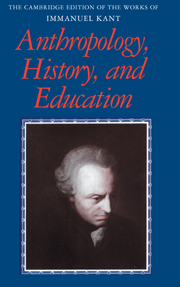Book contents
- Frontmatter
- Contents
- General editors' preface
- Preface
- General introduction
- 1 Observations on the feeling of the beautiful and sublime (1764)
- 2 Essay on the maladies of the head (1764)
- 3 Review of Moscati's work Of the corporeal essential differences between the structure of animals and humans (1771)
- 4 Of the different races of human beings (1775)
- 5 Essays regarding the Philanthropinum (1776/1777)
- 6 A note to physicians (1782)
- 7 Idea for a universal history with a cosmopolitan aim (1784)
- 8 Review of J. G. Herder's Ideas for the philosophy of the history of humanity. Parts 1 and 2 (1785)
- 9 Determination of the concept of a human race (1785)
- 10 Conjectural beginning of human history (1786)
- 11 Some remarks on Ludwig Heinrich Jakob's Examination of Mendelssohn's Morning hours (1786)
- 12 On the philosophers' medicine of the body (1786)
- 13 On the use of teleological principles in philosophy (1788)
- 14 From Soemmerring's On the organ of the soul (1796)
- 15 Anthropology from a pragmatic point of view (1798)
- 16 Postscript to Christian Gottlieb Mielcke's Lithuanian–German and German–Lithuanian dictionary (1800)
- 17 Lectures on pedagogy (1803)
- Editorial notes
- Glossary
- Bibliography
- Index
8 - Review of J. G. Herder's Ideas for the philosophy of the history of humanity. Parts 1 and 2 (1785)
Published online by Cambridge University Press: 05 May 2013
- Frontmatter
- Contents
- General editors' preface
- Preface
- General introduction
- 1 Observations on the feeling of the beautiful and sublime (1764)
- 2 Essay on the maladies of the head (1764)
- 3 Review of Moscati's work Of the corporeal essential differences between the structure of animals and humans (1771)
- 4 Of the different races of human beings (1775)
- 5 Essays regarding the Philanthropinum (1776/1777)
- 6 A note to physicians (1782)
- 7 Idea for a universal history with a cosmopolitan aim (1784)
- 8 Review of J. G. Herder's Ideas for the philosophy of the history of humanity. Parts 1 and 2 (1785)
- 9 Determination of the concept of a human race (1785)
- 10 Conjectural beginning of human history (1786)
- 11 Some remarks on Ludwig Heinrich Jakob's Examination of Mendelssohn's Morning hours (1786)
- 12 On the philosophers' medicine of the body (1786)
- 13 On the use of teleological principles in philosophy (1788)
- 14 From Soemmerring's On the organ of the soul (1796)
- 15 Anthropology from a pragmatic point of view (1798)
- 16 Postscript to Christian Gottlieb Mielcke's Lithuanian–German and German–Lithuanian dictionary (1800)
- 17 Lectures on pedagogy (1803)
- Editorial notes
- Glossary
- Bibliography
- Index
Summary
TRANSLATOR'S INTRODUCTION
Johann Gottfried Herder (1744–1803) was Kant's student in Königsberg between 1762 and 1765, but he had also come under the influence of Kant's eccentric friend Johann Georg Hamann (1730–88), whose views on reason, religion and society were deeply opposed to Kant's Enlightenment principles. During the 1770s, Herder rose to prominence as a critic of the Enlightenment, and in 1784 he produced the first volume of his greatest work, Ideas for the Philosophy of the History of Humanity. Kant was invited to review the work by Christian Gottfried Schütz, editor of the Allgemeine Litteraturzeitung (published in Jena and Leipzig).
The first of Kant's reviews, presented here under the heading ‘I.’, appeared in January, 1785. It quotes extensively from Herder (though the quotations are often mere paraphrases, and do not even always accurately reflect what Herder said). Kant's chief criticisms of Herder in this first review are directed at Herder's attempt to derive all human characteristics from the upright posture of the human body and at Herder's attempt to argue for the spirituality and consequent immortality of the human soul using analogies of nature. Kant plainly admired Herder's wide learning and fertile imagination, but the tone of his reviews is condescending, since he plainly regarded the ideas of his former student as lacking in philosophical rigor, and as permitting poetic imaginings to substitute for clearheaded thinking at crucial points.
- Type
- Chapter
- Information
- Anthropology, History, and Education , pp. 121 - 142Publisher: Cambridge University PressPrint publication year: 2007
- 2
- Cited by



